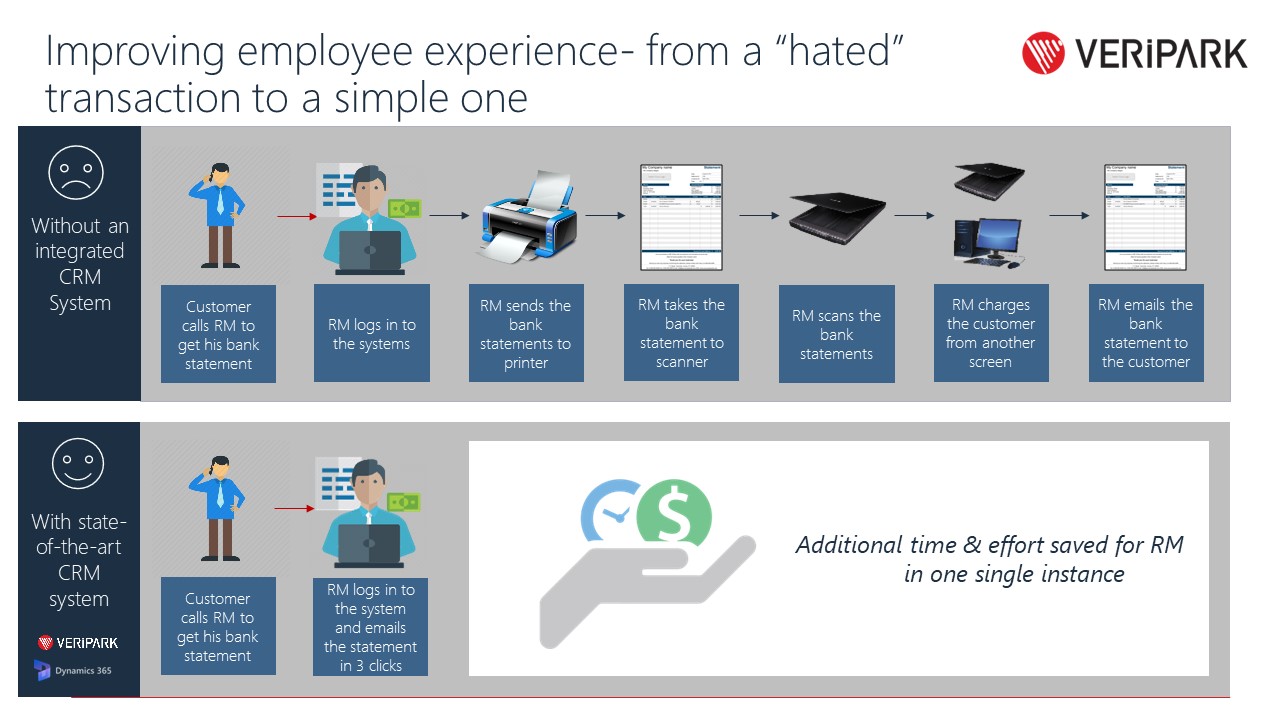
Successful CRM implementation depends on human centric change management – find out why
You’ve done your research into how integrated Customer Engagement (CRM) technology can help your financial organization become more efficient and profitable. You have a multidisciplinary project team ready to manage the logistics of integration and implementation. But what about the human dimension of CRM change management – how will you encourage employees to adopt and adapt to this new way of working?
Read on to find out:
- How to improve your chances of successful digital transformation
- How you can boost your chances of success and ROI
- Why implementing your new CRM is just the start
- How transformative change depends on people not technology
- Why a hybrid approach to training encourages CRM adoption
Improving your chances of successful digital transformation
According to Gartner and others, some 50% of organizational change initiatives fail. That’s partly because too many project teams don’t think deeply enough about what change means to ordinary employees. As such, they underestimate the instinctive human resistance to change that their project will face.
However, McKinsey has found that companies that include their employees early in the planning process are more likely to reach their goals 75% of the time. VeriPark has helped many clients successfully implement its CRM solution and has a wealth of knowledge about what works in change management for digital banking projects. Including end users early in the process is just one of the key steps we recommend.
We asked our Chief Customer Officer, Ozge Tekalp, to share her top tips for a successful CRM change management project. If you would like to discuss how VeriPark’s CRM Change Management Consultancy can help with your CRM implementation, please see her contact details at the end of this post.
Integrating people and CRM systems
Successful change management depends on building trust, acceptance, and usage with frontline employees. That’s true for any transformative digital project but particularly one as integral to your business as a new CRM. It’s not simply about the technical aspects, such as importing clean data and integrating it with existing systems: you must integrate CRM with the company culture and people’s day-to-day work.
“The best use of technology is important and is possible with people involvement” says Ozge. Success depends on leading and supporting people instead.”
Adopting new technology, such as CRM, involves fundamental changes not just to tech but to business processes. That’s why VeriPark works closely with customers that choose our products and services on effective planning, implementation, and training. We want them to maximize the benefits and ROI of CRM for both their business model and their employees.
"The first thing to know and remember is that people don’t like change. Humans are particularly resistant to change that happens to us and over which we have no choice or control, where we have no ‘agency’. Change management is essentially about helping people feel comfortable and in control of the pace of change, even when that change is rapid and disruptive to traditional ways of working."
Ozge Tekalp
Putting principles into practice
"Many businesses do try to consider the human element of change management,” says Ozge, “but the evidence from Gartner and others suggests that too many don’t consider it soon enough or in enough depth. That’s why VeriPark stresses the need to build change management thinking into the entire process from the start. We also advocate the following seven fundamentals of human centric change management":
- Owners
- Pilots and wave rollout
- Designated Power Users
- Change Champions
- Feedback and support
- Ongoing training, including gamification
- Monitoring and evaluation.
Owners
Success starts with ownership and involvement. Essentially, the change process needs to be on everyone’s agenda, so everyone knows the where, what, why, when, and how. That means the leadership team must demonstrate and communicate the importance and value of the project by taking ownership of the project.
Owners or sponsors are not just responsible for budget sign-off. They are also responsible for approving and coordinating essential changes to business structures and processes. And they must ensure all employees have the training and other resources to adapt to those changes and adopt new working practices.
"The ideal owner is the leadership team,” says Ozge, “since they set the direction of the company and strongly influence the culture. Clear leadership from them is needed to sell the benefits of the new CRM. Employees need to not just understand the imperative for change but also actually desire that change."
Pilots and wave rollout
Testing is vital at every stage of the implementation process and in all settings where the CRM will be used. This is your opportunity to test and learn – not just what works technically but also what people like and dislike about the new system. What might make it easier or harder for people to adopt the new processes?
"Say we are working with a bank that has 500 branches,” explains Ozge. “We might start with a pilot in just ten and if that proves successful move up to 30 and then 50 and so on. This incremental approach means you can adapt the system in real time to better suit your organization, while fixing any bugs without crashing your entire service."
Designated Power Users
These are people who know everything about the inner workings of system. They can answer technical questions from multiple teams and talk the language of developers. They can effectively act as a bridge between the end users and the core project team.
Change Champions
These people are best found within teams and, ideally, are trusted and respected colleagues. They need to be able to talk the language of end users (free from tech jargon) and share their own passion for the benefits of the new system with others. They will also need to be the sort of person that people turn to for help and advice, effectively the team’s ‘helpdesk’.
"A key Change Champion role is helping colleagues quickly experience the benefits of the new CRM system in their daily work,” says Ozge. “One way is to show them how the automation and integration turns a previously tedious and disliked process into a fast and simple action. The sooner employees appreciate having things like Single Customer View, the sooner they will embrace the new system."

Feedback mechanisms
A central Helpdesk should collect feedback through the Power Users, Change Champions, and others to build a database of frequently asked questions (FAQs) and the best answers. This activity should be coordinated by the CRM Program Manager, who is responsible for overseeing implementation in the business. That person must be close to the organization’s day-to-day business (rather than in IT) with a direct report to the Owner/Sponsor and the ability to lead adoption with other business unit owners.
Digital transformation success essentially requires a balanced hybrid strategy. This involves providing employees with quick, efficient experiences of straightforward digital tasks, like onboarding. At the same time, it must offer them extensive advice and help for more detailed activities.
Ozge Tekalp, Chief Customer Officer, VeriPark
Ongoing training and support
Training is a basic requirement for any new system. However, it often doesn’t get done to sufficient depth or for long enough to really embed new processes in daily work at every level throughout the business. There are various tools you can use to make the training more memorable and effective, including using gamification techniques to motivate and reward early adopters and frequent users.
"One particularly effective communications tool,” says Ozge, “is to use technology to send personalized auto-calls from the CEO or other senior leaders to every individual in the business. Each person hears the CEO address them by name as a valued colleague and then go on to explain the importance of the rollout. The CEO then tells them how they can get involved and earn rewards in the process."
It’s also important to make learning a group activity (rather than a solitary – and at times isolating – experience). VeriPark’s team brings people together, either online or in person, to share and reflect on their experiences. It’s also important to remember and respect that people learn at different paces; some are slower than others not least because they might be more thorough.
We always try to make the learning process fun, because when people are relaxed and enjoying the process they learn faster and remember more detail for longer. We congratulate people on each step they take and make them feel a valued part of the overall campaign. We don't just show them the way; we walk alongside them, cheering their progress and making them feel integral to our collective goal.
Ozge Tekalp, Chief Customer Officer, VeriPark
As with training, success depends on sustained monitoring and evaluation at depth across the company until a new system has become an established way of life. Dashboards are an effective mechanism for monitoring, evaluating, managing, and encouraging employees to use the new system. By assigning employees tasks that they can only complete by logging into the system, you can reward active users and support those who are more reluctant to make the switch.
The other reason for careful monitoring is to choose the best time to switch off the old system, which some people will cling to simply out of a sense of familiarity.
"It is worth keeping your old system for a limited period of adjustment, but it should become progressively harder to use – the new system should be the default choice. Evaluating usage will enable you to choose when to force the pace of change by removing access to the old system completely” concludes Ozge.
Conclusion
Contact VeriPark for your change management and CRM adoption needs
We stand ready to help banks and financial organizations embrace the power of digital transformation. If you would like to discuss any change management aspects of implementing a new VeriPark CRM system or other VeriPark digital banking solution, please contact our Chief Customer Officer, Ozge Tekalp.





